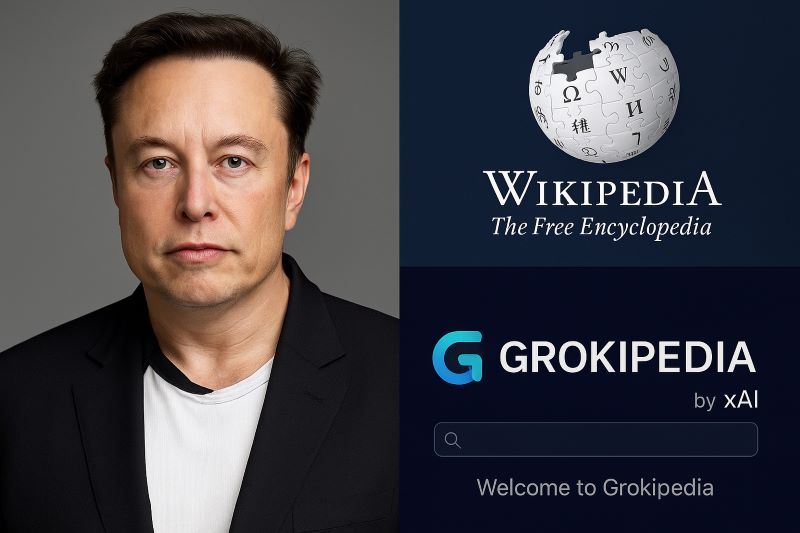In October 2025, the fields of science and technology, as well as information, will witness a new storm of public opinion. Elon Musk, the CEO of Tesla and SpaceX, publicly criticized Wikipedia on social media for its serious political bias, saying that its content “is increasingly like ideological propaganda rather than a neutral source of knowledge.” Almost simultaneously, xAI, the artificial intelligence company owned by Musk, announced the launch of a brand-new AI-driven encyclopedia platform called “Grokipedia”, which focuses on “objective knowledge generated and verified by artificial intelligence” to replace what he described as “traditional encyclopedias that have lost credibility”. This move immediately drew global media and academic attention. Some people saw it as a challenge to the knowledge openness system, while others believed it might be a new chapter in AI knowledge management.
According to Reuters, Musk has said in several public statements that Wikipedia has long leaned towards liberal issues and has a systematic tendency in political, social, and historical entries. He even sarcastically called it “Wokipedia” on social media, suggesting that it was infiltrated by “Woke Politics” (Woke Politics). In response, xAI officially launched Grokipedia on October 27th and declared that the platform’s goal is “to provide the public with undistorted and fact-verified true knowledge.” This project is connected to the AI assistant “Grok” previously launched by xAI, which uses deep learning models to analyze multi-source data and automatically generate encyclopedia entries. Official data shows that on the first day of its launch, the platform generated over 880,000 entries, covering fields such as science, history, culture, and current affairs.
However, this seemingly disruptive attempt soon sparked controversy. The Guardian of the UK pointed out that some political entries on Grokipedia were found to have obvious right-wing tendencies in the early stage of their launch. For instance, they extensively quoted remarks questioning the election results in the content related to the “US Capitol riot”, while also downplaying Donald Trump’s responsibility in the incident. The report holds that this content orientation is highly consistent with Musk’s political stance on social media in recent years, suggesting that his slogan of “de-bias” may mask another ideological orientation.
Wikipedia also responded promptly. Its latest fundraising announcement unusually released a new statement that was believed to be aimed at Musk: “25 years later, Wikipedia still belongs to humans, edited by volunteers, not generated by billionaires or machines.” This wording is widely regarded by the outside world as a satire on Grokipedia. The Wikimedia Foundation emphasizes that although AI technology can assist in knowledge management, the value of an encyclopedia lies in “collaborative, transparent and verifiable human contributions”, rather than being a product of closed algorithms or personal control.
In the academic circle, discussions about AI encyclopedias are more complex. Jason Becker, a scholar from the Internet Institute at the University of Oxford, pointed out that AI does have the ability to accelerate knowledge organization and information retrieval, but if algorithms and datasets lack transparency, the result may lead to “seemingly objective mechanical neutrality, but actually concealing deeper biases.” He believes that the “problem” of Wikipedia lies in its openness, while that of Grokipedia is its centralization. Neither of them has resolved the structural predicament of knowledge production.
Some analysts point out that the essence of this debate is not which side is more “neutral”, but rather reflects the re-competition among tech giants for the public knowledge space. Since its establishment in 2001, Wikipedia has become one of the world’s most influential knowledge-sharing platforms thanks to its volunteer open editing model. Its core value lies in “decentralization” and “consensus correction”. Although errors or positional deviations are prone to occur, on the whole, dynamic balance is achieved through collective correction. Musk’s AI encyclopedia, on the other hand, attempts to replace this “imperfect consensus of human editors” with algorithmic precision and data integration. This represents a new logic of knowledge: from “collective compilation by all” to “unified compilation by machines”, and from “consensus governed by humans” to “facts governed by calculation”.

But the problem is that the neutrality of AI has never been proven. Artificial intelligence relies on training data and parameter Settings, and these are precisely the parts that are most easily influenced by ideology. If the content of the AI encyclopedia depends on the algorithm system of xAI, its objectivity is bound to be questioned. In addition, some technical experts also pointed out that Grokipedia had problems of “content overlap and unclear citation” in its early tests. Some entries were almost completely copied from the original Wikipedia text, which was suspected of copyright infringement. This makes people wonder whether the so-called “AI-generated knowledge” is merely an “AI-rewritten Wikipedia”.
For the public, Musk’s new platform is both curious and worrying. On the one hand, his view of criticizing Wikipedia as “biased” has gained wide resonance among the conservative group. On the other hand, a large number of scholars are concerned that if AI encyclopedias become “algorithmic outlets for truth”, it will intensify information polarization and weaken society’s trust in knowledge. After all, when “truth” is no longer formed by diverse debates but is “calculated” by technology companies, the openness and public nature of knowledge may be completely rewritten.
According to the latest news reports, the Grokipedia team is preparing to launch a content review and fact-checking mechanism to address the outside world’s doubts about its objectivity. xAI stated that the platform will introduce an independent supervisory committee and gradually open up some code and datasets to enhance transparency. However, this statement did not quell the controversy. A spokesperson for the Wikimedia Foundation told The New York Times in an interview: “We welcome any innovation that promotes the dissemination of knowledge, but if a platform claims to be ‘more objective than humans’, it must undergo stricter ethical and social scrutiny.”
It can be foreseen that this “AI encyclopedia battle” will not end soon. It is not merely a dispute over technology and ideas, but also concerns the fundamental proposition of the information society in the 21st century – who defines knowledge and who writes the facts. When AI begins to dominate narratives, truth may become more efficient, but also more fragile. In the future Internet world, perhaps a new balance between “human consensus and machine intelligence” will be sought between Musk’s challenges and Wikipedia’s persistence.













Leave a comment